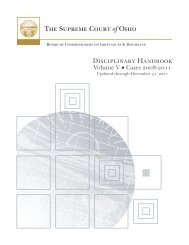The Supreme Court of Ohio - Supreme Court - State of Ohio
The Supreme Court of Ohio - Supreme Court - State of Ohio
The Supreme Court of Ohio - Supreme Court - State of Ohio
You also want an ePaper? Increase the reach of your titles
YUMPU automatically turns print PDFs into web optimized ePapers that Google loves.
<strong>Supreme</strong> <strong>Court</strong> Protects Public Access to <strong>Court</strong> Records<br />
M<br />
ore than 100 years ago, drawing on a large body <strong>of</strong> law, a<br />
Cincinnati judge first crystallized a fundamental principle<br />
that is still a cornerstone <strong>of</strong> <strong>Ohio</strong> government. Today, <strong>Ohio</strong><br />
judges are working to take this important concept into the 21 st<br />
century.<br />
“Public records are the people’s records. <strong>The</strong> <strong>of</strong>ficials in<br />
whose custody they happen to be are mere trustees for the<br />
people ….”<br />
So wrote Judge Rufus B. Smith <strong>of</strong> the Superior <strong>Court</strong> <strong>of</strong><br />
Cincinnati (a body that no longer exists) in 1901. <strong>The</strong> <strong>Supreme</strong><br />
<strong>Court</strong> <strong>of</strong> <strong>Ohio</strong> quoted Judge Smith verbatim when it first<br />
adopted this universal principle <strong>of</strong> openness as statewide law in<br />
1960. <strong>The</strong> idea was codified in statute with the passage <strong>of</strong> the<br />
Public Records Act in 1963. It was reaffirmed in 1976 in the<br />
foundational public records case <strong>of</strong> Dayton Newspapers v. City <strong>of</strong><br />
Dayton, decided by the <strong>Supreme</strong> <strong>Court</strong> <strong>of</strong> <strong>Ohio</strong>, and it remains<br />
the bedrock <strong>of</strong> <strong>Ohio</strong> public records law to this day.<br />
<strong>The</strong> <strong>Supreme</strong> <strong>Court</strong> <strong>of</strong> <strong>Ohio</strong> in 2008 completed an<br />
administrative process to craft judicial rules that will maintain<br />
this principle and keep court records open.<br />
<strong>The</strong> rules were crafted by the <strong>Supreme</strong> <strong>Court</strong> Commission<br />
on the Rules <strong>of</strong> Superintendence for <strong>Ohio</strong> <strong>Court</strong>s, chaired by<br />
Justice Judith Ann Lanzinger, and they were put out for two<br />
periods <strong>of</strong> extensive public comment that resulted in revisions<br />
and improvements.<br />
Among other provisions, the rules establish that<br />
court records are presumed open and state that a<br />
court may restrict access to a particular document<br />
only “if it finds by clear and convincing evidence<br />
that the presumption <strong>of</strong> allowing public access is<br />
outweighed by a higher interest.” <strong>The</strong> rule <strong>of</strong>fers<br />
specific factors for judges to consider when weighing<br />
the “higher interest,” including,<br />
but not limited to, “risk <strong>of</strong> injury to<br />
persons, individual privacy rights<br />
and interests, proprietary business<br />
information, public safety, and<br />
fairness <strong>of</strong> the adjudicatory process.”<br />
22<br />
2008 Annual Report • <strong>The</strong> <strong>Supreme</strong> <strong>Court</strong> <strong>of</strong> <strong>Ohio</strong>
















